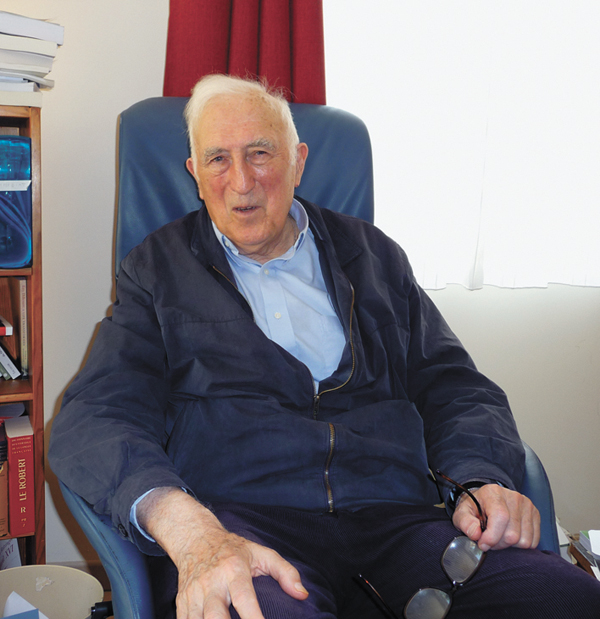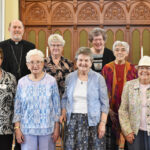By Barb Arland-Fye
Editor
Jean Vanier couldn’t travel to Davenport to receive the Pacem in Terris Peace and Freedom Award so Bishop Martin Amos and I flew 4,200 miles to France to present it to him six summers ago.

Jean Vanier, recipient of the Pacem in Terris Award, is pictured at his home in Trosly-Breuil, France, during a July 7, 2013, interview.
Vanier called himself the “beginner” of L’Arche, an international federation of communities that welcome and celebrate people with intellectual disabilities, fostering growth and allowing everyone to share their talents and abilities. The idea is to create inclusive communities of faith and friendship, like the L’Arche community in Clinton, Iowa, which celebrates its 45th anniversary this year.
Our encounter with Vanier, a gentle giant that some people called a saint, left a lasting impression on us about what it means to be community, and to celebrate the joy and dignity of each person regardless of intellectual ability.
Vanier’s death last week at the age of 90 saddened both of us, but wonderful memories resurfaced of our interactions with him in a small village in northern France where he began L’Arche a half-century ago.
“I took two people from a violent institution and we started living together. I had no idea that it would grow and that there would be a sort of vision, an international vision,” Vanier told me during an interview at his home.
His extraordinary contribution to peace, demonstrating how it begins with the individual, warranted the decision to travel abroad to hand-deliver the award, Bishop Amos, now retired, said. I felt blessed to journey with him to the place where Vanier began his work to build caring relationships which foster the inclusion of people with intellectual disabilities so they have a sense of belonging in the world.
In the apostolic letter for which the award is named, Pope John XXIII “talked about one fundamental principle: that each individual is truly a person. Without this basic principle all other rights and duties, all the injustices are on shifting sand,” Bishop Amos said during the award ceremony in France.
“So many wonderful men and women of different cultures, churches and religions, with and without religion, seeking ways of peace, have come to share their lives with those who are weak and fragile and have been transformed by them,” Vanier said in accepting the award.
“Jean Vanier could not have been nicer to us,” Bishop Amos wrote in an email to me last week. “He was certainly very down to earth, very humble, had a gentle demeanor, a sense of humor and it was obvious he loved the people around him and they loved him as well. That was very obvious as we visited the different sites.”
During the award ceremony, a L’Arche member walked up to the podium and held on to Vanier’s arm as he gave his acceptance speech. Vanier didn’t miss a beat, continuing his talk with a big smile on his face.
“It was there that his sense of humor really showed when WE forgot the award,” Bishop Amos said. Actually, the bishop is being kind. I left the award in my room in the guesthouse! When it was time to present it to Vanier, the bishop looked at me and I looked at him and the smiles froze on our faces. Vanier sat between us and in good humor said he would have expected something like that to happen at L’Arche!
The ceremony continued, with laughter, dancing and a performance by L’Arche members that told a story of discovery, about how God is to be found deep within the human heart. Vanier seemed deeply moved by the performance.
At the end of our visit, Vanier hosted a dinner party for us. “They pulled out all the stops,” Bishop Amos recalled. “I can’t remember if it was an appetizer or desert where we found out that this was a very special treat that they got just for us.”
Our visits to L’Arche communities in the countryside also spoke to the legacy of Jean Vanier. “It was amazing the interaction and loving care that was extended to the members,” Bishop Amos said. “They were not someone’s job, but someone’s love. I still remember the young woman who wanted to say something to me in English and she said, ‘I love you baby!”
(Editor Barb Arland-Fye can be reached at arland-fye@davenportdiocese.org.)











